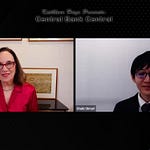Charles Calomiris is a lifelong professor of economics and finance. He has participated in policy making at the U.S. Treasury and other advisory bodies in Washington.
Dr. Calomiris is on the warpath when it comes to the Federal Reserve. He says that with inflation now stuck between 2-1/2% to 3%, there was no justification for the FOMC to cut is its key rate for the third and final time of 2024 this past week
He warns that the Fed is going to find out over the course of 2025 that inflation is not coming down and it will not be able to execute the rate cuts it signaled this past week. And this may manifest just when the Fed’s next chair is being installed in 2026 and is expected by the Trump administration to deliver the rate cuts currently being promised.
With these risks in prospect, Dr. Calomiris says it’s more important than ever for the Fed to remedy the flaws in its policy making process. He has long been an advocate of rules that it needs to adopt to keep in from straying of estray off the appropriate policy path.
Dr. Calomiris warns that the fiscal condition of the U.S. economy will pose challenges that Fed policy will have to meet. He is also concerned that bank regulation has been neglected to and will have to be addressed.
So dive in, hear and see what he has to say on all of this and more.
Calomaris: Fed did as expected...and it was a mistake 00:00:48:15 - 00:01:41:10
It was what they were hoping to do, and it was widely expected... What do you think of that? Thumbs up, thumbs down. Mistake. Yeah, it was a mistake. I think it was a mistake. I think I thought that the Wall Street Journal's article the day before the meeting was exactly on target, that there really was no economic sort of data driven justification for what they did at all…. Let's let's go through the list. Inflation expectations are above 3%, which is kind of shocking. The inflation rate, whether you're looking at the PCE or the CPI, is substantially above their target and has not been coming down. It's not like it just leapt up. It just hasn't been coming down. You could say inflation is is sort of stuck at 3%.
Rate cut rationale: Promises promises or politics politics? 00:01:41:10 - 00:02:58:00
We had an informal discussion in the Shadow Open Market Committee yesterday after the cut to see if if anyone in the Shadow Open Market Committee could find a reason for it…. And I think that the reason that everyone sort of gravitated toward is, well, the Fed said it was likely to cut. So, you know, maybe you could say it didn't want to rattle the market when I think that that's a none of us really believed that. We think because after all, the market was also aware of the economic news. And the one member who I won't name who came up with an alternative story that I thought was very possible said, look, this is political. The Fed had signaled before the election that they were going to do a rate cut….
Exasperated by reality 00:04:38:04 - 00:05:23:05
Current inflation expectations <are at >3% When you put that together, I would say monetary policy is accommodative or neutral, but it certainly is not going to get inflation down. So I'm really just shocked. I mean, the inflation expectations are high. The core inflation rates are stuck and the Fed cut rates… I'm very pessimistic about the Fed going forward institutionally because, you know, I don't see how you tell the story about the Fed looking good.
Dissent- Strong Women lead the way 00:05:44:22 - 00:06:36:22
Exactly right. But I'm thinking it's interesting how some of the more hawkish people on the Fed Open Market Committee right now are women…Michelle Bowman, Board of Governors: for the first time in 20 years, someone on the Board dissented and she dissented against a cut…she was more concerned about where prices are going. We just had Beth Hemmack, new Cleveland Fed Bank president - she dissented. Who else has spoken out….Lorie Logan, president of Dallas Fed..and <before that> … Esther George… Loretta Mester.
Talking the talk isn’t walking the walk: Inflation …00:08:58:14 - 00:09:52.13
…and I think we have to note that the Fed is finally starting to publicly emphasize its own uncertainties about the long term real interest rate. By the way, this is something I've been talking about since 2020, and I think that the Fed has been much too sanguine about the view that long term real interest rates haven't gone up in the last several years…. the Fed, cutting the inflation rate <Seps?> isn't the same as forecasting the inflation rate. They're two different things. So you can talk happy talk all you want, but happy talk about inflation falling isn't the same as having it actually likely to fall.
Charles’ personal ‘SEP’ for 2025 00:09:52:13 - 00:10:24:06
And they, I think, obviously have. So I think the Fed is going to find out that inflation is not going to come down and that I think that you're you're going to see they're not going to be doing any cuts next year. And that I think we're going to be in a very tricky situation under that scenario where if inflation doesn't come down and then you have a new Fed leader being installed with an inflation rate stuck at two and a half percent, what will that new Fed leader do?
What does not work now 00:14:14:01 - 00:15:21:07
They want to anchor long term inflation rates and they've completely dropped the ball… And so we know that under any kind of respectable inflation targeting rule, you can't be targeting a particular long term unemployment rate or other labor market indicator. And when you are four plus years, way above your inflation target, you've lost credibility.
What the world needs now: Systematic and transparent 00:17:06:24 - 00:17:30:22
If this last four years of experience isn't enough to convince people that we need to actually force the Fed to be transparent and systematic - because in the absence of forcing them to be transparent and systematic, they will choose to play politics and not be systematic and transparent - this experience is conclusive evidence that the Fed can't be trusted.
Fed should adopt a rule or a few - 00:18:01:19 - 00:127.50.19
So it can say, well, <here is> our rule… and they might even announce three or four and give a weighted average if they can't reach agreement on any one. And then the FOMC would mainly be deliberating about what its announced rule would be….So that would be interesting because then instead of the SEPS PR exercise, we actually have the Fed having to say this is our current algebraic rule based on these observable variables. The Taylor rule is just one. There are many different ones in the Shadow Open Market Committee.
The benefit of a consistent target- 00:25:28:19 - 00:25:53.07
You know, the Fed should maintain a consistent targeting regime where when you're above it, you do one thing. When you're below it, you do something- symmetric. Right. So I think if the Fed were to be clear in that way, think how informative the FOMC meetings would be because we'd hear people now arguing about, well, you know, we currently are announced targets and our announced beliefs are this.
Upbeat on Trump- 00:27:14:19 - 00:27:50:19
I have studied that and shown that it has to do with reducing the risks associated with increased regulation or stricter regulatory compliance. You get increased sales and asset growth of public corporations, and you can see that it's very clear that it's a very large effect. So starting with deregulation, I'd say we have a strong belief that there's going to be an acceleration of growth, but it's I would say it's a supply side acceleration growth as well as demand side.
Trump is a pragmatist -disrupter 00:29:40:04 - 00:30:03:04
And if he secures the border and gets rid of several hundred thousand people, I think that that freedom to decide based on pragmatism. And we know he's not an ideologue, he's a pragmatist. I think the same thing on tariffs. So let me give you an example. How much did Trump really change NAFTA when he did USMC? It was almost nothing.
Boom coming!..Fore! 00:31:29:14 - 00:31:55:15
I think we're going to see an economic boom continuing. I think the Fed will wish that it had increased rates at this last meeting, maybe rather than just keeping them steady <ther wa a rate cut in December..FYI>. I think we're really there behind the curve. But that's not my major concern. My concern is medium term. Where's the fiscal discipline and where's the banking system, prudential regulation.
Bubble, bubble banking trouble? 00:31:55:17 - 00:32:43:23
So we haven't learned much from the 2023 experience. We have several hundred very weak banks in the U.S. I don't hear anyone in the administration talking about the need to strengthen and make more credible prudential regulation while simplifying and streamlining. And I'm very concerned about that. This is the problem. If you ask me. This is the time to strengthen while simplifying and streamline it, to strengthen prudential regulation, force banks to raise capital because I think we're in for a very rough ride several years from now, because as the fiscal problems mount, we're going to see interest rate rise due to inflation risks and we're going to see commercial real estate, which is already in a very vulnerable situation.
De-titling entitlements: Kudos to Nikki Haley - 00:34:49:13 - 00:35:20:04
And the answer, in my estimation, there's about somewhere around 1.3 trillion of annual cuts. We don't need ‘two.’ True, $2-trillion would be great, but we do need $1.3 Trillion and we can't get there, cannot get there without figuring out how to reform entitlements. There's been a dishonest conversation about this. The only honest politician in this last election talk about entitlements was Nikki Haley, who said we have to get serious.
Charles William Calomiris (born November 8, 1957) is an American financial policy expert, author, and co-director of the Institute for Research in Economics in Washington, D.C. Previously, he was a professor at Columbia Business School, where he was the Henry Kaufman Professor of Financial Institutions and the Director of Columbia Business School Program for Financial Studies,[1] and was director of the Center for Politics, Economics and History at UATX.[2]
Charles Calomiris received a B.A. in economics from Yale University and a Ph.D. in economics from Stanford University.[1][4][5] Calomiris thereafter served in numerous capacities with organizations addressing economic policy, including serving as a Fellow at the Manhattan Institute for Policy Research, a member of the Shadow Open Market Committee, co-director of the Hoover Institution's Program on Regulation and the Rule of Law, and a Research Associate of the National Bureau of Economic Research.[1][4] He has advised government entities as a researcher at the Office of Financial Research in the United States Department of the Treasury,[1] and as a member of the International Financial Institution Advisory Commission of the United States Congress.[4]
In 2014, Calomiris coauthored, with Stephen Haber, Fragile By Design: The Political Origins of Banking Panics and Scarce Credit.[11][12] [7] In the book, Calomiris and Haber argue that the problems faced by the banking industry arise from the extensive network of government regulations effectively directing how they do business, including that "geographic restrictions on banking made banks too small to weather regional economic shocks".[13] The book received various accolades, including an American Publishers 2015 Award for best book in Business, Finance and Management, and being named to best books of the year lists by the Financial Times and Bloomberg Businessweek.[4]













Share this post